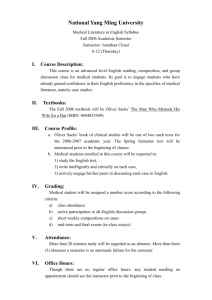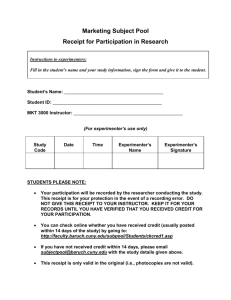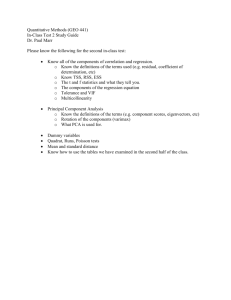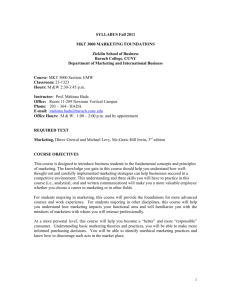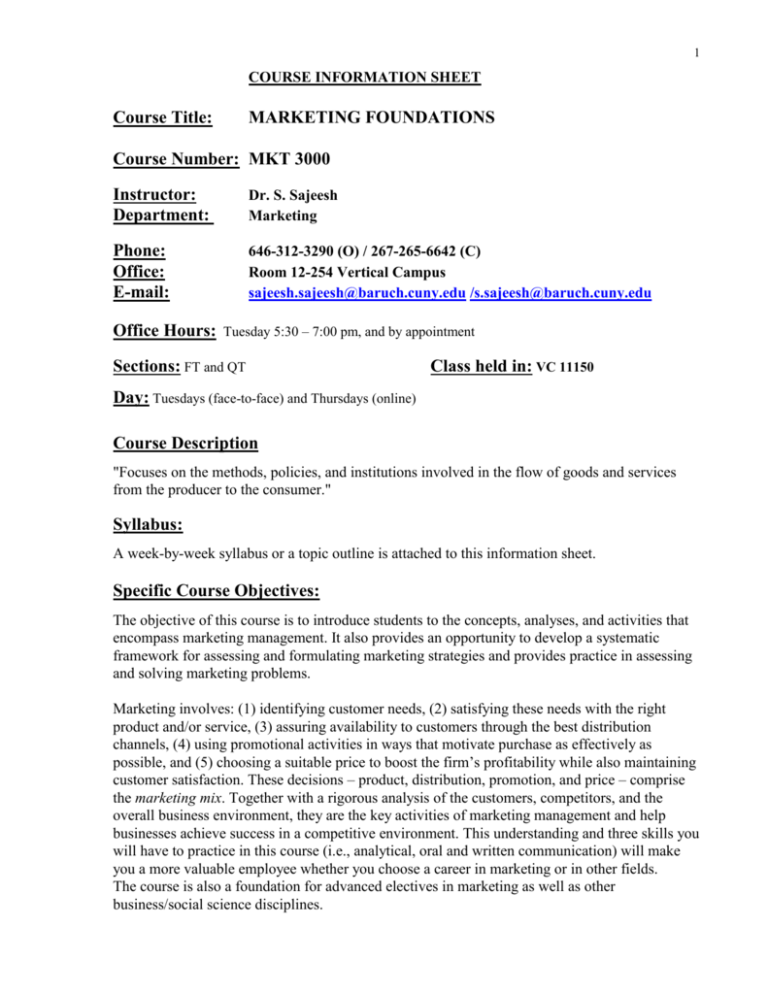
1
COURSE INFORMATION SHEET
Course Title:
MARKETING FOUNDATIONS
Course Number: MKT 3000
Instructor:
Department:
Dr. S. Sajeesh
Marketing
Phone:
Office:
E-mail:
646-312-3290 (O) / 267-265-6642 (C)
Room 12-254 Vertical Campus
sajeesh.sajeesh@baruch.cuny.edu /s.sajeesh@baruch.cuny.edu
Office Hours:
Tuesday 5:30 – 7:00 pm, and by appointment
Sections: FT and QT
Class held in: VC 11150
Day: Tuesdays (face-to-face) and Thursdays (online)
Course Description
"Focuses on the methods, policies, and institutions involved in the flow of goods and services
from the producer to the consumer."
Syllabus:
A week-by-week syllabus or a topic outline is attached to this information sheet.
Specific Course Objectives:
The objective of this course is to introduce students to the concepts, analyses, and activities that
encompass marketing management. It also provides an opportunity to develop a systematic
framework for assessing and formulating marketing strategies and provides practice in assessing
and solving marketing problems.
Marketing involves: (1) identifying customer needs, (2) satisfying these needs with the right
product and/or service, (3) assuring availability to customers through the best distribution
channels, (4) using promotional activities in ways that motivate purchase as effectively as
possible, and (5) choosing a suitable price to boost the firm’s profitability while also maintaining
customer satisfaction. These decisions – product, distribution, promotion, and price – comprise
the marketing mix. Together with a rigorous analysis of the customers, competitors, and the
overall business environment, they are the key activities of marketing management and help
businesses achieve success in a competitive environment. This understanding and three skills you
will have to practice in this course (i.e., analytical, oral and written communication) will make
you a more valuable employee whether you choose a career in marketing or in other fields.
The course is also a foundation for advanced electives in marketing as well as other
business/social science disciplines.
2
At a more personal level, this course will help you become a “informed” and likely “better”
consumer. Understanding basic marketing theories and practices, you will be able to make more
informed purchasing decisions.
Learning Goals:
Upon successful completion of this course, you will have acquired the following learning
outcomes:
Content-related Outcomes:
Appreciate the role of marketing in business
Know that marketing puts customers at the center of their thinking in its quest for
profitability
Recognize the importance of research in the marketing process
Know basic marketing principles and understand their underlying rationale.
Understand segmentation, target marketing, positioning and basic strategies in developing
a marketing mix - product, promotion, pricing, and place.
Cognitive and Application Related Outcomes:
Identify and analyze marketing problems; develop creative solutions to address them;
articulate reasons for choosing various solutions
Understand that there are rarely clear-cut situations in marketing. Develop skills to make
sound assumptions in dealing with uncertainties
Make effective oral presentations to persuade a target audience
Develop a coherent marketing plan for a product and provide sound rationale for chosen
strategies
Using simple marketing concepts, observation, and reasoning, construct basic marketing
principles
Develop skills to be a participating and effective member of a team
The above are consistent with Baruch’s BBA learning goals which are:
Analytical and Technological Skills: Students will possess the quantitative, technological,
analytical, and critical thinking skills to evaluate issues faced in business and professional
careers.
Communication Skills- written: Students will have the necessary written communication skills to
convey ideas and information effectively and persuasively.
Communication Skills- oral: Students will have the necessary oral communication skills to
convey ideas and information effectively and persuasively.
Civic Awareness and Ethical Decision Making: Students will have the knowledge base and
analytical skill to guide them when faced with ethical dilemmas in business. Students will have
an awareness of political, civic and public policy issues affecting business.
Global Awareness: Students will know how differences in perspectives and cultures affect
business practices around the world.
3
General Education: Students will acquire a foundation in the sciences, arts, and the social
sciences.
Business Knowledge/Integrative Abilities: Students will have knowledge of the basic disciplines
in business management, and be able to apply and integrate that knowledge effectively in
problem specification and problem solving.
Proficiency in a Single Discipline: Students will possess a deep understanding of and
intellectual competence in at least one business discipline.
Learning methods will include case and article discussions, student presentations and
evaluations, written assignments, and lectures by the instructor.
Recommended Texts/Materials:
o Kotler and Armstrong, Principles of Marketing, 15th Edition, Pearson/Prentice
Hall, Publication Date: January 19, 2013 | ISBN-10: 0133084043 | ISBN-13: 9780133084047 | Edition: 15
o The 14th, 13th, or the 12th editions of the textbook are also fine. I do not want you
to use older edition than 12th edition because the examples tend to be very
outdated.
You may decide not to purchase the study guide – that is perfectly fine.
Course Requirements:
1. Read assigned material prior to class in which it will be discussed. The lecture will NOT
be a reiteration of the reading. Rather, it will go well beyond the book in breadth and
depth of content as well as industry applications.
2. Class attendance and meaningful participation is mandatory to do well in this class. Class
discussions and exercises will give you opportunity to apply concepts discussed in the
textbook.
3. Ask questions and participate in class discussions and activities.
Grading:
Your grade for the course will be based on the following:
Class Participation / Homework
10 %
Online Blackboard Assignments
15%
Marketing Plan (Group)
20 %
Mid-term Exam
25 %
Final Exam
25 %
Research participation
(subject pool requirement)
5%
4
Research Participation (subject pool assignment): Please read information given in pages 6-7
of this document and follow the instructions to get 5% of the grade.
Class Participation/Homework: You are expected to attend class regularly and participate in
everyday class discussion. You must be prepared to discuss the assigned chapter readings, and
articles at all times. Feel free to use participation as a way of getting any questions answered or
sharing an insight or comment. It’s likely that if you’re wondering about something, others in the
class feel the same way. Participation should be enjoyable and also help you to learn. At the
same time you can also learn a lot from hearing others comments and responding to them. Class
participation, attendance and homework count for 10% of your grade, so take them seriously!
Online Assignments (15%)
As this is a hybrid class the online assignments are critical and set the stage for the in-class covered
content and discussions.
On Blackboard, you will go through the presentations, and then do the online quizzes. The goal of these
assignments are two-fold: (1) students get to check how well they learned the concepts; and (2) the
instructor gets to verify how well the class (and each student individually) grasped the main concepts of
each chapter.
Mid-term Exam and Final Exam: Mid-term exam is tentatively scheduled toward the middle of
the semester. It will be held on 3//18 (tentatively). The mid-term exam will cover all material
covered till the mid-term. Final exam will cover only material covered after the mid-term exam.
Anything covered in class and in any assigned reading can be on the tests. Multiple choice
questions will be application oriented: they will not test your recall of facts but will assess your
understanding of marketing concepts and their applications.
Marketing Plan Assignment (Group Project):
This semester you will work in groups of five and develop a marketing plan for a new
product/service. The groups can be formed on Blackboard. You and your group will work on
this assignment throughout the semester. If you haven’t selected your group by end of Week 2, I
will assign you randomly to a group.
In the course outline, the class where your group is expected to turn in the marketing plan is
marked.
Your marketing plan should include the following:
5 C’s analysis (including Company and new Product Description)
Marketing Objectives for the new Product
Target market, positioning and competitive benchmarking (comparison with competitive
offerings)
Marketing Mix Strategy (Product, Price, Distribution, Promotion) and your justification
for the chosen strategies
I will provide specific instructions on the marketing plan write-ups as well as grading rubric for
the marketing plans in the first few weeks of classes and will also post the information on the
Blackboard website.
5
Recording Policy:
Students may not tape record or video tape class discussions without prior permission from the
instructor.
Attendance Policy:
All students are required to attend every session of their courses. If a freshman or sophomore is
absent in excess of twice the number of class sessions per week, the instructor must give the
student a WU grade, which counts as an F. The instructor may give a junior or senior a WU
grade (the equivalent of an F) for excessive absences. The Registrar’s office requires that
students who have attended no classes before week 5 be dropped from the class.
ACADEMIC INTEGRITY:
Students are expected to know and adhere to the Baruch College Academic Honesty Policy,
found at http://www.baruch.cuny.edu/academic/academic_honesty.html. It states, inter alia, that
Academic dishonesty is unacceptable and will not be tolerated. Cheating, forgery,
plagiarism and collusion in dishonest acts undermine the college's educational mission and
the students' personal and intellectual growth. Baruch students are expected to bear
individual responsibility for their work, to learn the rules and definitions that underlie the
practice of academic integrity, and to uphold its ideals. Ignorance of the rules is not an
acceptable excuse for disobeying them. Any student who attempts to compromise or
devalue the academic process will be sanctioned.
My policy is to give a failing grade to any assignment that has been plagiarized or an exam in
which you have cheated. In addition, I am required by College policy to submit a report of
suspected academic dishonesty to the Office of the Dean of Students. This report becomes part
of your permanent file.
Students with Disabilities:
Students with disabilities may receive assistance and accommodation of various sorts to enable
them to participate fully in courses at Baruch. To establish the accommodations appropriate for
each student, please alert me to your needs and contact the Office of Services for Students with
Disabilities, part of the Division of Student Development and Counseling. For more information
contact Ms. Barbara Sirois, Director of this office in NVC 2-271 or at (646) 312-4590.
6
RESEARCH PARTICIPATION REQUIREMENT
(Marketing Subject Pool)
For information: http://baruchmarketing.info/subpool/Students
Email: subjectpool@baruch.cuny.edu
As a MKT 3000 student, 5% of your course credit is allocated to Research Participation (Marketing Subject Pool).
You can earn this credit by participating in 2 research studies, each up to 60 minutes long (a study that is less
than 60 minutes still counts as a full 60-minute study), all conducted by Marketing faculty and PhD students. These
studies often involve filling out one or more questionnaires and completing tasks such as viewing ads or product
descriptions, or listening to audio material.
Participation in these studies is voluntary. If you choose not to participate in the research studies, you can still get
the 5% course credit by completing a written assignment. The assignment involves reading a case study and
submitting a 3-page (typed) report on it.
WHY PARTICIPATE?
Your participation in these research studies provides you with several important benefits:
(1) Much of what you are learning in MKT 3000 comes from such research studies, conducted at universities. Thus,
your participation would help advance knowledge in Marketing, which you continue to benefit from.
(2) Being a good marketer depends on your ability to obtain useful information from consumers. Participating in
these studies gives you hands-on experience and understanding of this consumer research process.
(3) The reputation of business schools is based, in part, on the quality and quantity of its knowledge creation. By
helping in this process of knowledge creation, you are helping Baruch’s reputation and ultimately, your
attractiveness to employers.
HOW TO GET CREDIT?
a) You can get the 5% course credit by participating in two research studies, each taking up to 60 minutes, OR
by completing a 3-page written assignment.
b) Your instructor will not know whether you participated in the two research studies or submitted a written
assignment.
c) Course credit for a research study will only be given if you sign up online in advance. “Walk-ins” are NOT
permitted. See “How to sign up for studies” below.
d) Research studies will be scheduled throughout the semester after the first 3 to 4 weeks of classes. You will be
informed when studies are scheduled.
IMPORTANT: Please remember that studies are scheduled by different faculty and PhD students as soon
as they are ready. This means that the number of studies scheduled varies from week to week. If no
studies are scheduled during certain weeks, particularly towards the beginning of the semester, be
patient. Keep checking for new studies so that you may complete the requirement in a timely manner.
e) For the written assignment, you can sign up anytime during the semester (see “How to sign up for a written
assignment” below), but you must submit it within 2 weeks of signing up, and before the last day of class.
f) When you complete a study, you will get a “receipt for participation” from the researcher. Make sure that
you get a receipt and keep it with you until you have received credit for the study (see “How to check if you
got credit” below).
HOW TO SIGN UP FOR STUDIES?
Go to http://baruchmarketing.info/subpool/Students/signup.asp
IMPORTANT: when signing up for studies, you must use the same ID number (the last 8 digits of your CUNY ID
number) each time. This will ensure that you get the proper credit.
HOW TO SIGN UP FOR A WRITTEN ASSIGNMENT?
Go to http://baruchmarketing.info/subpool/Students/signupc1.asp
HOW TO CHECK IF YOU GOT CREDIT?
Credit is usually posted within 2 weeks of completing a study. Do check shortly thereafter to ensure that you
have received credit. To check if you received credit, go to
http://baruchmarketing.info/subpool/Students/ckcred1.asp
7
WHAT TO DO IF YOU DID NOT GET CREDIT?
If you did not get credit within 2 weeks of completing the study, please email subjectpool@baruch.cuny.edu and
explain the problem. Make sure to provide information about the study you participated in (Study Code, date and
time), the last 8 digits of your CUNY ID, and the MKT3000 section you are enrolled in.
Blackboard Website:
This course will have a Blackboard website. Please check this website regularly since all
messages to class will be posted there by the instructor. The website will show lecture slides,
additional readings, etc. so get in the habit of visiting Blackboard regularly and frequently.
CLASS SCHEDULE
Chapters listed are from Kotler and Armstrong. Newspaper and magazine articles may also be
posted on Blackboard. You should read the assigned chapters and handouts before the relevant
class.
TENTATIVE SYLLABUS (COURSE OUTLINE)1
Class (Date)
Topics
Chapters
1 (1/28) (In-class)
Class orientation and overview of the course
Marketing: Managing Profitable Customer Relationships
2 (1/30) (Online)
Strategy and Plans
1, 2
3 (2/4) (In-class)
Customer satisfaction, value and loyalty
3, 4
4 (2/6) (Online)
Marketing Environment
3, 4
5(2/11) (In-class)
Gathering information, marketing research
3, 4
6 (2/13) (Online)
Consumer Behavior
5
7 (2/18) (In-class)
Consumer Behavior (contd.), B2B marketing
5, 6
8(2/25) (In-class)
Segmentation and Targeting
7
9 (2/27) (Online)
Differentiation and Positioning
7
10 (3/4) (In-class)
Positioning (contd.) and Competition
18
11 (3/6) (Online)
New product development
9
12 (3/11) (In-class)
Product Life Cycle Strategies
9
13 (3/13) (Online)
Catch-up and Mid-term Review
14 (3/18) (In-class)
Mid-term Exam
1
Any changes to this syllabus will be announced in class and posted on Blackboard.
8
Class (Date)
Topics
Chapters
15 (3/20) (Online)
Pricing Products: Capturing Customer Value
10, 11
16 (3/25) (In-class)
Pricing Products: Pricing Strategies
10, 11
17 (3/27) (Online)
Product, Services and Brands
8
18 (4/1) (In-class)
Strategies using Excel (Brand Equity,
Measuring Willingness-to-pay, Margin Analysis)
19 (4/3) (Online)
Marketing Channels and Supply Chain Management
Retailing and Wholesaling
12, 13
20 (4/8) (In-class)
Marketing Channels and Supply Chain Management
Retailing and Wholesaling (contd.)
12, 13
21 (4/10) (Online)
Time for Group Work
22 (4/24) (Online)
Integrated Marketing Communication Strategy
Advertising
23 (4/29) (In-class)
Advertising (contd.) and ROI for Media Spending
Group project (Marketing Plan due)
24 (5/1) (Online)
Online Marketing
17
25 (5/6) (In-class)
Sales Promotion
16
26 (5/8) (Online)
Managing in a Global Marketplace
19
27 (5/13) (In-class)
Class Wrap-up
28 (5/15) (Online)
Marketing Ethics
14, 15
20


